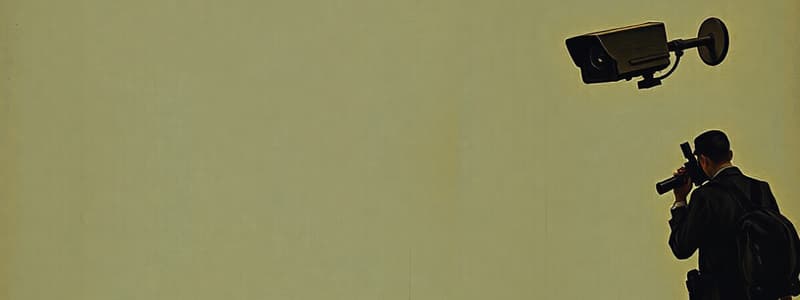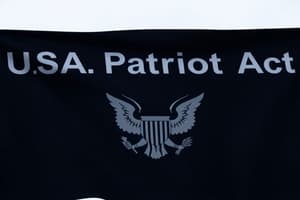Podcast
Questions and Answers
What is the primary purpose of the USA Patriot Act as stated in its preamble?
What is the primary purpose of the USA Patriot Act as stated in its preamble?
- To regulate international communication
- To provide funding for law enforcement agencies
- To deter and punish terrorist acts (correct)
- To establish military protocols
Which surveillance capabilities were expanded by the USA Patriot Act?
Which surveillance capabilities were expanded by the USA Patriot Act?
- Monitoring the activities of public officials
- Installation of pen registers and trap and trace devices (correct)
- Warranted surveillance of foreign ambassadors
- The use of drone surveillance
What change in surveillance process was introduced by the USA Patriot Act?
What change in surveillance process was introduced by the USA Patriot Act?
- Mandated transparency in surveillance activities
- Introduction of warrantless wiretapping (correct)
- Increased requirement of search warrants for all surveillance
- Increased oversight of the National Security Agency (NSA)
What information can the government access without suspicion of wrongdoing under the USA Patriot Act?
What information can the government access without suspicion of wrongdoing under the USA Patriot Act?
What was a primary catalyst for the enactment of the USA Patriot Act?
What was a primary catalyst for the enactment of the USA Patriot Act?
What does a pen register do?
What does a pen register do?
Who can authorize warrantless wiretapping under the USA Patriot Act?
Who can authorize warrantless wiretapping under the USA Patriot Act?
Which organization was notably authorized to undertake extensive electronic surveillance post-Patriot Act?
Which organization was notably authorized to undertake extensive electronic surveillance post-Patriot Act?
What is one argument supporters of the Patriot Act make regarding law enforcement?
What is one argument supporters of the Patriot Act make regarding law enforcement?
What is a major criticism of the surveillance powers granted by the Patriot Act?
What is a major criticism of the surveillance powers granted by the Patriot Act?
How does the Patriot Act enhance the wiretapping laws?
How does the Patriot Act enhance the wiretapping laws?
What does the term 'roving wiretap' refer to in the context of the Patriot Act?
What does the term 'roving wiretap' refer to in the context of the Patriot Act?
What consequence do opponents attribute to the broad surveillance powers provided by the Patriot Act?
What consequence do opponents attribute to the broad surveillance powers provided by the Patriot Act?
What type of crimes can warrants issued under the Patriot Act be applied to?
What type of crimes can warrants issued under the Patriot Act be applied to?
What is the potential danger of identifying individuals labeled as suspected terrorists?
What is the potential danger of identifying individuals labeled as suspected terrorists?
Which aspect of the Patriot Act do supporters highlight as a critical advantage?
Which aspect of the Patriot Act do supporters highlight as a critical advantage?
Flashcards
Patriot Act surveillance
Patriot Act surveillance
The Patriot Act gave law enforcement wider power to monitor suspected terrorists, often overcoming obstacles like privacy protections and technical limitations.
USA Patriot Act
USA Patriot Act
A U.S. law enacted after 9/11 to increase security and law enforcement powers, primarily to combat terrorism.
Wiretapping updates
Wiretapping updates
The Patriot Act updated wiretapping laws to address modern communication technologies.
Pen register/Trap & Trace
Pen register/Trap & Trace
Signup and view all the flashcards
Intelligence gathering
Intelligence gathering
Signup and view all the flashcards
Warrantless Wiretapping
Warrantless Wiretapping
Signup and view all the flashcards
Privacy concerns
Privacy concerns
Signup and view all the flashcards
National Security Agency (NSA)
National Security Agency (NSA)
Signup and view all the flashcards
Enhanced Surveillance Powers
Enhanced Surveillance Powers
Signup and view all the flashcards
Loose definition of "suspect"
Loose definition of "suspect"
Signup and view all the flashcards
Federal crime warrants
Federal crime warrants
Signup and view all the flashcards
Pre-9/11 Surveillance
Pre-9/11 Surveillance
Signup and view all the flashcards
Individual rights
Individual rights
Signup and view all the flashcards
Financial and student info access
Financial and student info access
Signup and view all the flashcards
Foreign Intelligence Gathering
Foreign Intelligence Gathering
Signup and view all the flashcards
Roving wiretaps
Roving wiretaps
Signup and view all the flashcards
Study Notes
USA Patriot Act of 2001
- Introduced following the 9/11 attacks to enhance US security.
- Aims to deter and punish terrorism, improve law enforcement tools.
- Dramatically altered US law, enhancing surveillance and information access.
Surveillance Expansion
- Broadened law enforcement's ability to use pen registers, trap and trace devices (including caller-ID boxes) and record computer data.
- Allowed access to personal/student records with a certification of relevance to a criminal investigation.
- Enabled NSA's massive electronic surveillance program, including "warrantless wiretapping."
NSA Surveillance Program
- Authorized by executive order (Presidential order).
- Monitored phone calls, internet activity (email, web, etc.), text messages of anyone suspected of being outside the U.S
- This included targets within the US in the context of anti-terror efforts.
- Controversial, raising questions of privacy and civil liberties vs. security.
Arguments For the Patriot Act
- Removed barriers to quick surveillance of suspected terrorists, particularly within US borders. The approach addressed restrictions that made it difficult to carry out surveillance in traditional ways.
- Updated wiretapping laws for modern technology, allowing intelligence gathering before a terrorist plot is carried out.
- Focused on early identification of involved individuals/organizations, and potentially stopping plots before they become fully formed.
- This prevented terrorists who might disappear due to early detection of plans.
Arguments Against the Patriot Act
- Increased surveillance powers reduced privacy protections.
- Loose definition of "suspected terrorist" could lead to unwarranted surveillance of innocent individuals.
- Allowed warrants for any federal crime, including misdemeanors. This led to a loss of individual rights to know if they were being investigated.
- This also allowed searches of property without notice to the individual.
- Roving wiretaps allowed surveillance without new warrants when the target moved.
Studying That Suits You
Use AI to generate personalized quizzes and flashcards to suit your learning preferences.




